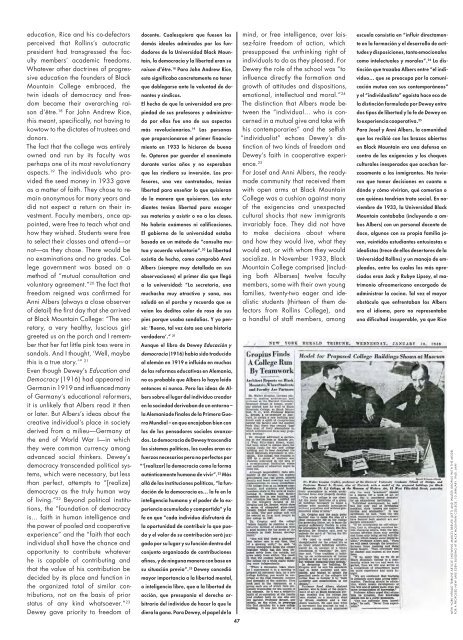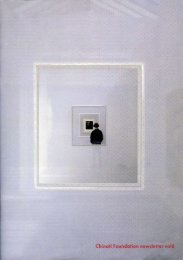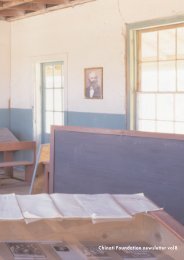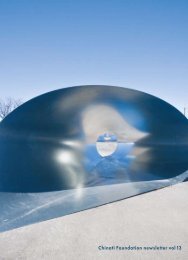Untitled - The Chinati Foundation
Untitled - The Chinati Foundation
Untitled - The Chinati Foundation
Create successful ePaper yourself
Turn your PDF publications into a flip-book with our unique Google optimized e-Paper software.
education, Rice and his co-defectors<br />
perceived that Rollins’s autocratic<br />
president had transgressed the faculty<br />
members’ academic freedoms.<br />
Whatever other doctrines of progressive<br />
education the founders of Black<br />
Mountain College embraced, the<br />
twin ideals of democracy and freedom<br />
became their overarching raison<br />
d’être. 18 For John Andrew Rice,<br />
this meant, specifically, not having to<br />
kowtow to the dictates of trustees and<br />
donors.<br />
<strong>The</strong> fact that the college was entirely<br />
owned and run by its faculty was<br />
perhaps one of its most revolutionary<br />
aspects. 19 <strong>The</strong> individuals who provided<br />
the seed money in 1933 gave<br />
as a matter of faith. <strong>The</strong>y chose to remain<br />
anonymous for many years and<br />
did not expect a return on their investment.<br />
Faculty members, once appointed,<br />
were free to teach what and<br />
how they wished. Students were free<br />
to select their classes and attend—or<br />
not—as they chose. <strong>The</strong>re would be<br />
no examinations and no grades. College<br />
government was based on a<br />
method of “mutual consultation and<br />
voluntary agreement.” 20 <strong>The</strong> fact that<br />
freedom reigned was confirmed for<br />
Anni Albers (always a close observer<br />
of detail) the first day that she arrived<br />
at Black Mountain College: “<strong>The</strong> secretary,<br />
a very healthy, luscious girl<br />
greeted us on the porch and I remember<br />
that her fat little pink toes were in<br />
sandals. And I thought, ‘Well, maybe<br />
this is a true story.’” 21<br />
Even though Dewey’s Education and<br />
Democracy (1916) had appeared in<br />
German in 1919 and influenced many<br />
of Germany’s educational reformers,<br />
it is unlikely that Albers read it then<br />
or later. But Albers’s ideas about the<br />
creative individual’s place in society<br />
derived from a milieu—Germany at<br />
the end of World War I—in which<br />
they were common currency among<br />
advanced social thinkers. Dewey’s<br />
democracy transcended political systems,<br />
which were necessary, but less<br />
than perfect, attempts to “[realize]<br />
democracy as the truly human way<br />
of living.” 22 Beyond political institutions,<br />
the “foundation of democracy<br />
is… faith in human intelligence and<br />
the power of pooled and cooperative<br />
experience” and the “faith that each<br />
individual shall have the chance and<br />
opportunity to contribute whatever<br />
he is capable of contributing and<br />
that the value of his contribution be<br />
decided by its place and function in<br />
the organized total of similar contributions,<br />
not on the basis of prior<br />
status of any kind whatsoever.” 23<br />
Dewey gave priority to freedom of<br />
docente. Cualesquiera que fuesen los<br />
demás ideales admirados por los fun-<br />
dadores de la Universidad Black Moun-<br />
tain, la democracia y la libertad eran su<br />
raison d’être. 18 Para John Andrew Rice,<br />
esto significaba concretamente no tener<br />
que doblegarse ante la voluntad de do-<br />
nantes y síndicos.<br />
El hecho de que la universidad era pro-<br />
piedad de sus profesores y administra-<br />
da por ellos fue uno de sus aspectos<br />
más revolucionarios. 19 Las personas<br />
que proporcionaron el primer financia-<br />
miento en 1933 lo hicieron de buena<br />
fe. Optaron por guardar el anonimato<br />
durante varios años y no esperaban<br />
que les rindiera su inversión. Los pro-<br />
fesores, una vez contratados, tenían<br />
libertad para enseñar lo que quisieran<br />
de la manera que quisieran. Los estu-<br />
diantes tenían libertad para escoger<br />
sus materias y asistir o no a las clases.<br />
No habría exámenes ni calificaciones.<br />
El gobierno de la universidad estaba<br />
basado en un método de “consulta mu-<br />
tua y acuerdo voluntario”. 20 La libertad<br />
existía de hecho, como comprobó Anni<br />
Albers (siempre muy detallada en sus<br />
observaciones) el primer día que llegó<br />
a la universidad: “La secretaria, una<br />
muchacha muy atractiva y sana, nos<br />
saludó en el porche y recuerdo que se<br />
veían los deditos color de rosa de sus<br />
pies porque usaba sandalias. Y yo pen-<br />
sé: ‘Bueno, tal vez ésta sea una historia<br />
verdadera’.” 21<br />
Aunque el libro de Dewey Educación y<br />
democracia (1916) había sido traducido<br />
al alemán en 1919 e influido en muchas<br />
de las reformas educativas en Alemania,<br />
no es probable que Albers lo haya leído<br />
entonces ni nunca. Pero las ideas de Al-<br />
bers sobre el lugar del individuo creador<br />
en la sociedad derivaban de un entorno –<br />
la Alemaniade finales de la Primera Gue-<br />
rra Mundial – en que encajaban bien con<br />
las de los pensadores sociales avanza-<br />
dos. La democracia de Dewey trascendía<br />
los sistemas políticos, los cuales eran es-<br />
fuerzos necesarios pero no perfectos por<br />
“’[realizar] la democracia como la forma<br />
auténticamente humana de vivir”. 22 Más<br />
allá de las instituciones políticas, “la fun-<br />
dación de la democracia es… la fe en la<br />
inteligencia humana y el poder de la ex-<br />
periencia acumulada y compartida” y la<br />
fe en que “cada individuo disfrutará de<br />
la oportunidad de contribuir lo que pue-<br />
da y el valor de su contribución será juz-<br />
gado por su lugar y su función dentro del<br />
conjunto organizado de contribuciones<br />
afines, y de ninguna manera con base en<br />
su situación previa”. 23 Dewey concedió<br />
mayor importancia a la libertad mental,<br />
o inteligencia libre, que a la libertad de<br />
acción, que presuponía el derecho ar-<br />
bitrario del individuo de hacer lo que le<br />
diera la gana. Para Dewey, el papel de la<br />
47<br />
mind, or free intelligence, over laissez-faire<br />
freedom of action, which<br />
presupposed the unthinking right of<br />
individuals to do as they pleased. For<br />
Dewey the role of the school was “to<br />
influence directly the formation and<br />
growth of attitudes and dispositions,<br />
emotional, intellectual and moral.” 24<br />
<strong>The</strong> distinction that Albers made between<br />
the “individual… who is concerned<br />
in a mutual give and take with<br />
his contemporaries” and the selfish<br />
“individualist” echoes Dewey’s distinction<br />
of two kinds of freedom and<br />
Dewey’s faith in cooperative experience.<br />
25<br />
For Josef and Anni Albers, the readymade<br />
community that received them<br />
with open arms at Black Mountain<br />
College was a cushion against many<br />
of the exigencies and unexpected<br />
cultural shocks that new immigrants<br />
invariably face. <strong>The</strong>y did not have<br />
to make decisions about where<br />
and how they would live, what they<br />
would eat, or with whom they would<br />
socialize. In November 1933, Black<br />
Mountain College comprised (including<br />
both Alberses) twelve faculty<br />
members, some with their own young<br />
families, twenty-two eager and idealistic<br />
students (thirteen of them defectors<br />
from Rollins College), and<br />
a handful of staff members, among<br />
escuela consistía en “influir directamen-<br />
te en la formación y el desarrollo de acti-<br />
tudes y disposiciones, tanto emocionales<br />
como intelectuales y morales”. 24 La dis-<br />
tinción que trazaba Albers entre “el indi-<br />
viduo… que se preocupa por la comuni-<br />
cación mutua con sus contemporáneos”<br />
y el “individualista” egoísta hace eco de<br />
la distinción formulada por Dewey entre<br />
dos tipos de libertad y la fe de Dewey en<br />
la experiencia cooperativa. 25<br />
Para Josef y Anni Albers, la comunidad<br />
que los recibió con los brazos abiertos<br />
en Black Mountain era una defensa en<br />
contra de las exigencias y los choques<br />
culturales inesperados que acechan for-<br />
zosamente a los inmigrantes. No tuvie-<br />
ron que tomar decisiones en cuanto a<br />
dónde y cómo vivirían, qué comerían o<br />
con quiénes tendrían trato social. En no-<br />
viembre de 1933, la Universidad Black<br />
Mountain contababa (incluyendo a am-<br />
bos Albers) con un personal docente de<br />
doce, algunos con su propia familia jo-<br />
ven, veintidós estudiantes entusiastas e<br />
idealistas (trece de ellos desertores de la<br />
Universidad Rollins) y un manojo de em-<br />
pleados, entre los cuales los más apre-<br />
ciados eran Jack y Rubye Lipsey, el ma-<br />
trimonio afroamericano encargado de<br />
administrar la cocina. Tal vez el mayor<br />
obstáculo que enfrentaban los Albers<br />
era el idioma, pero no representaba<br />
una dificultad insuperable, ya que Rice<br />
NEW YORK HERALD TRIBUNE ARTICLE SHOWING MARCEL BREUER (LEFT) AND WALTER GROPIUS WITH THE MODEL<br />
FOR A PROPOSED NEW LAKE EDEN BUILDING AT BLACK MOUNTAIN COLLEGE, 10 JANUARY 1940. JAAF.






